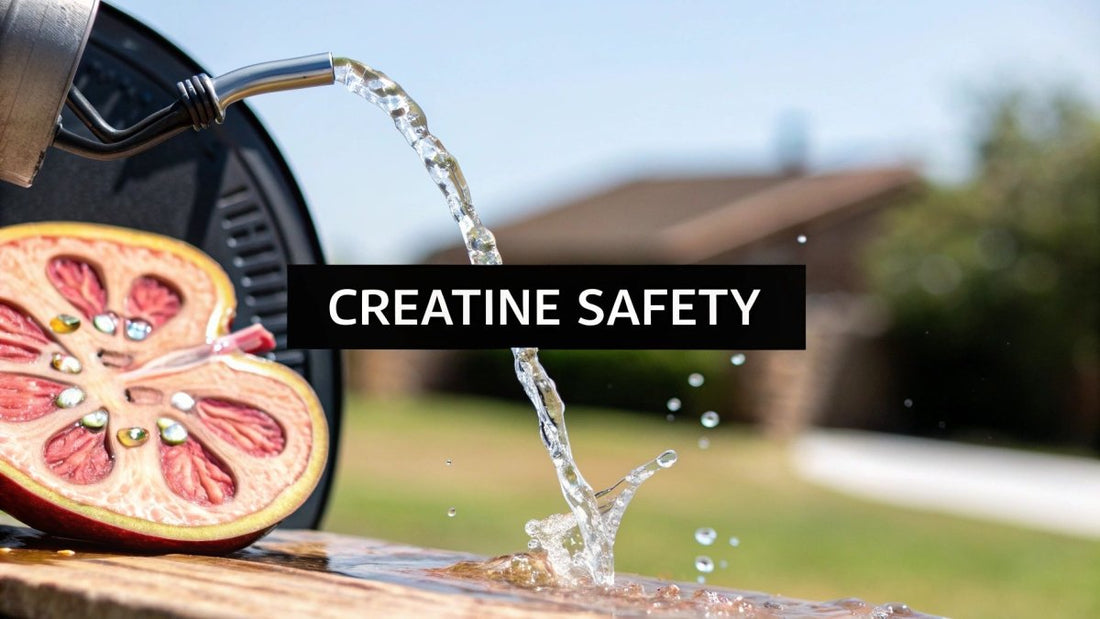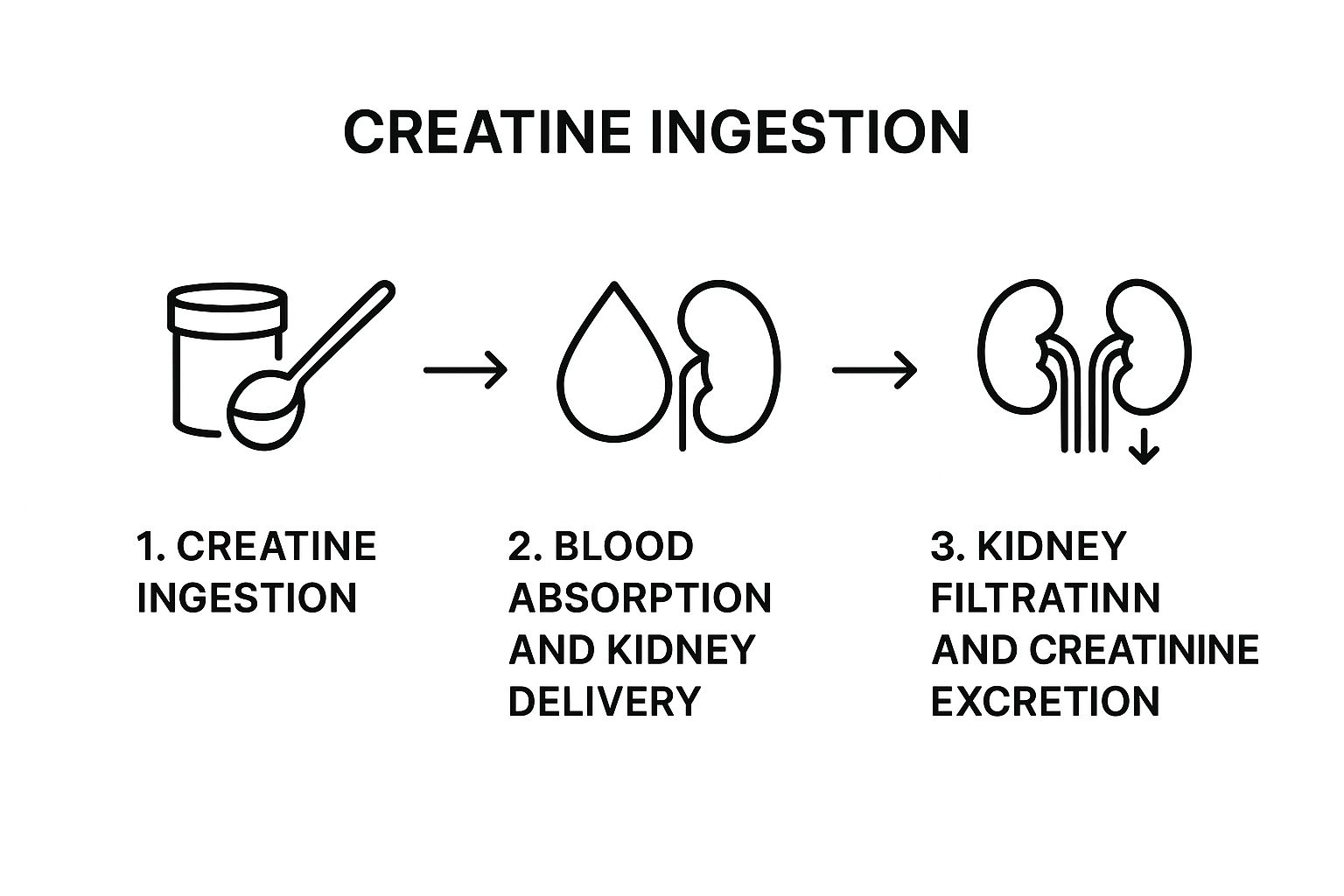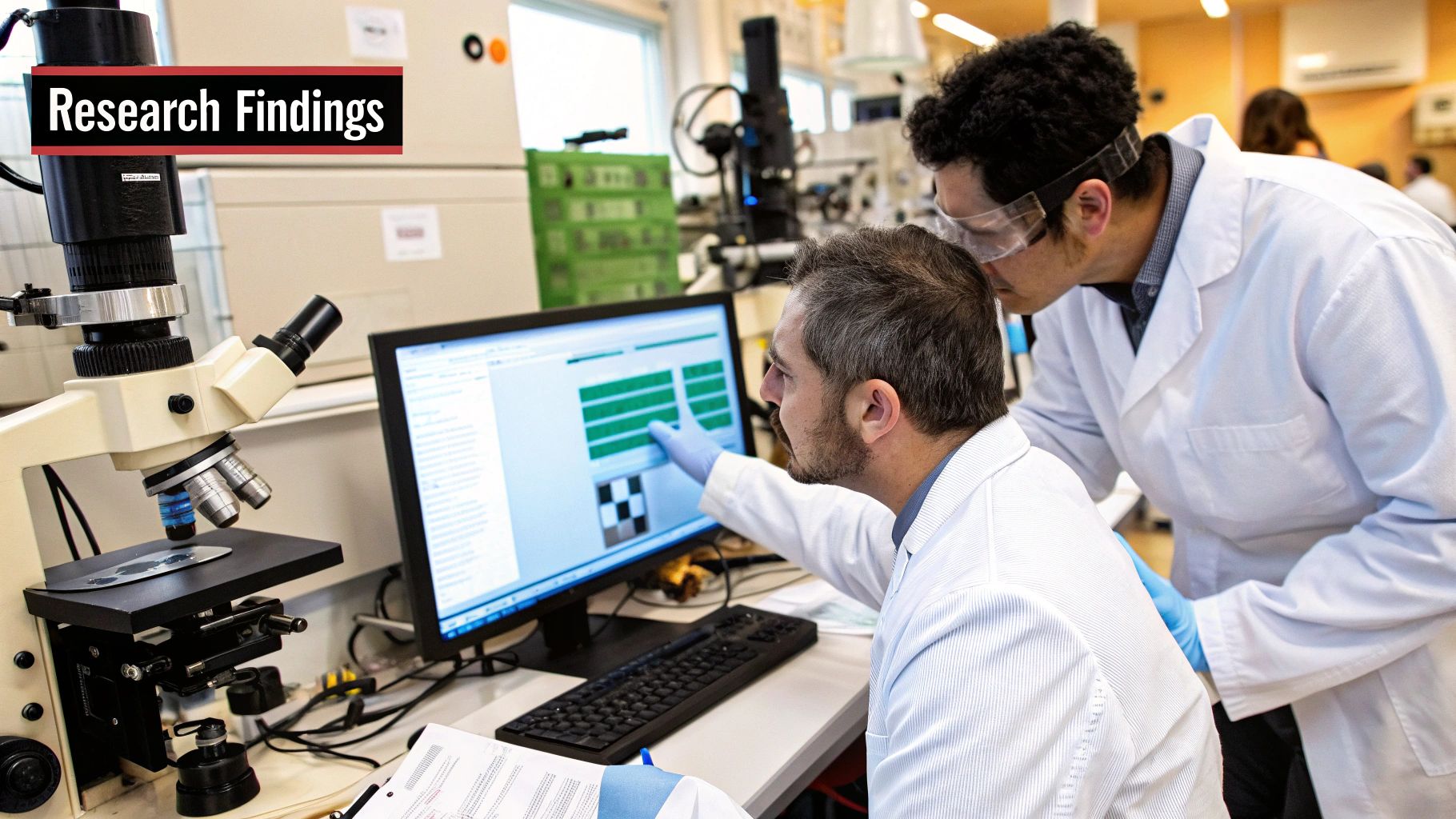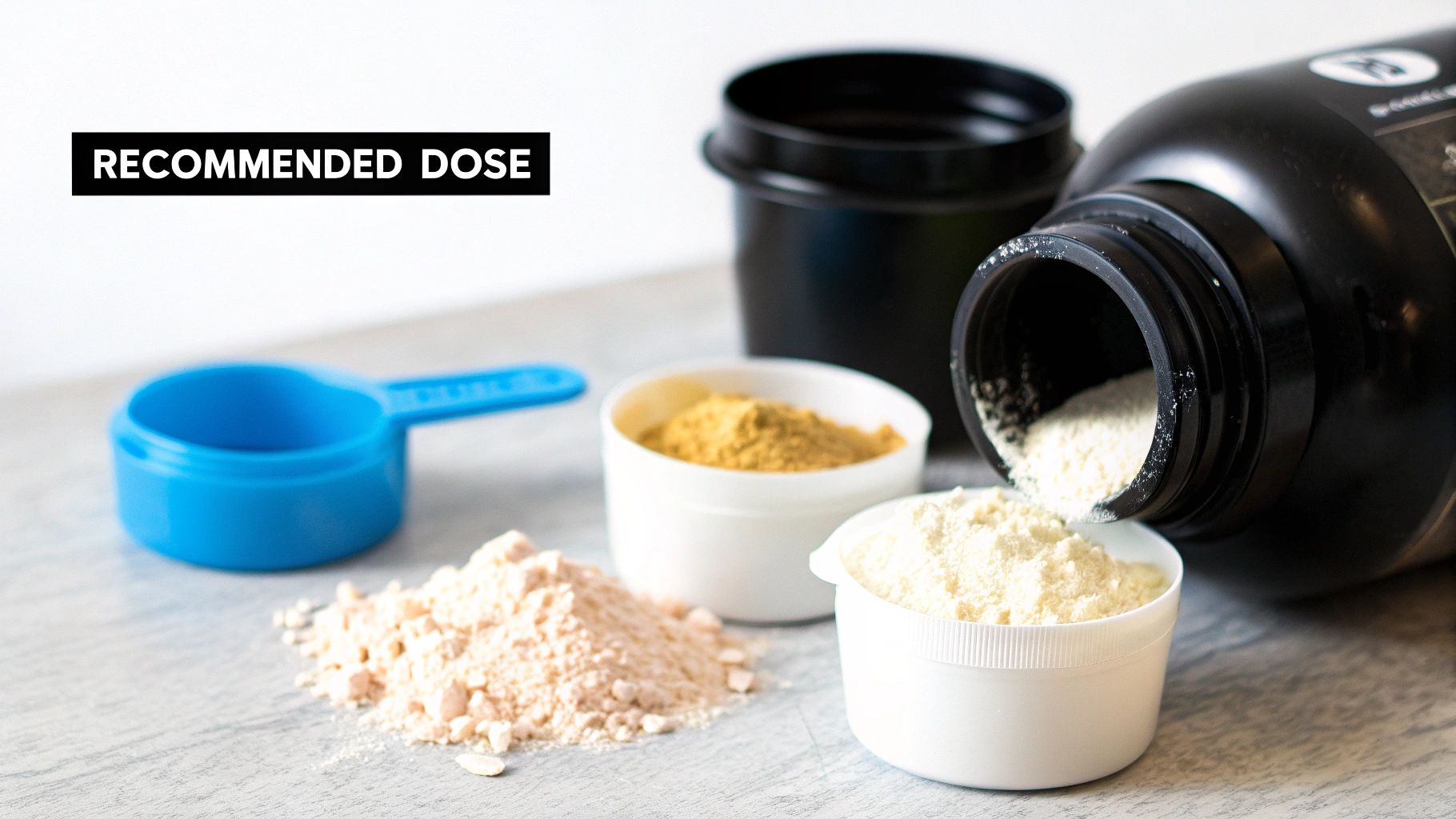
Does Creatine Damage Kidneys? The Scientific Truth
Share
For anyone with a healthy set of kidneys, the science is crystal clear: taking creatine at the recommended doses does not cause kidney damage. This myth has been circling for decades, but study after study has shown that the supplement is perfectly safe for kidney function.
The Final Verdict on Creatine and Kidney Health

The fear linking creatine to kidney problems is one of the most stubborn myths in the fitness world, and it's almost entirely based on a misunderstanding. The confusion usually comes down to one thing: creatinine.
When you supplement with creatine, your body naturally produces more of a waste product called creatinine. This shows up on blood tests, and since doctors use high creatinine as an indicator of poor kidney function, people jump to the wrong conclusion. But in this case, elevated creatinine is just an expected outcome of supplementation—it's not a sign that your kidneys are in trouble.
While creatine is remarkably safe for most people, it's critical to draw a line between healthy individuals and those with pre-existing kidney conditions. If you have a history of kidney disease, the smart move is always to talk to your doctor before adding any new supplement to your routine.
Creatine & Kidney Safety At a Glance
To cut through the noise, this table breaks down exactly what the research says about creatine and your kidneys.
| Topic | Key Finding | Recommendation |
|---|---|---|
| Healthy Adults | Decades of research show no evidence of kidney damage from long-term, recommended use. | Stick to the standard dose of 3-5 grams daily. No need to cycle off. |
| Blood Test Results | Creatine supplementation will predictably raise your creatinine levels. This is normal. | Always tell your doctor you’re taking creatine before any blood work to avoid a misdiagnosis. |
| At-Risk Groups | The safety of creatine hasn't been well-studied in people with pre-existing kidney disease. | If you have any kidney issues, you must consult a healthcare professional before use. |
This summary really drives the point home. For the vast majority of us, the concern isn't about whether creatine is dangerous, but about understanding why it's safe.
Major health authorities back this up. For instance, the Mayo Clinic's creatine safety guidelines confirm that taking creatine orally at appropriate doses is safe for up to five years in healthy people, with no significant harm to kidney function noted in research.
How Your Kidneys Actually Process Creatine
To really get why the whole “creatine wrecks your kidneys” idea is a myth, it helps to pull back the curtain on how your body actually handles it. Picture your kidneys as the most advanced filtration system you can imagine, constantly cleaning your blood. Their entire job is to pull out the junk and keep the good stuff.
The thing is, your body is already an old pro at dealing with creatine. It makes its own supply in the liver, kidneys, and pancreas. This self-produced creatine is absolutely vital for energy, specifically for recycling something called adenosine triphosphate (ATP). Think of ATP as the high-octane fuel your muscles burn for short, explosive movements—like that last rep on a bench press or a final sprint to the finish line.
Once your muscles use creatine for that burst of energy, it gets broken down into a waste product called creatinine. This creatinine then takes a ride through your bloodstream, heading straight for your kidneys.
The Filtration Journey from Muscle to Exit
When creatinine shows up at the kidneys, they know exactly what to do. They filter it from your blood and pass it along to your bladder to be flushed out with urine. This isn't a special event; it's a routine, 24/7 process that happens whether you're taking a creatine supplement or not. Your kidneys were built for this.
The entire journey—from taking creatine to filtering its byproduct—is a remarkably simple and efficient process, as you can see here.

When you supplement with creatine, you’re just giving your muscles more of a compound they already know and use. As a result, you’ll naturally have a bit more creatinine in your blood for your kidneys to filter out. This is a completely normal and expected outcome.
It doesn’t signal a problem. It just means the filtration system has a bit more work to do—kind of like a post office getting more mail during the holidays. The system isn't broken; it's just handling a higher, but manageable, volume.
A healthy kidney's job is to filter waste products like creatinine. Supplementing with creatine increases the amount of creatinine to be filtered, but it does not damage the filtration system itself.
For healthy kidneys, this slight increase in workload is nothing to worry about. It’s well within their impressive capacity. Of course, you can always help them do their job better. Staying well-hydrated is crucial, as plenty of water helps your kidneys flush out waste products with ease. We dive deeper into this in our guide on the right water intake with creatine.
So, for anyone with healthy kidneys, the question of does creatine damage kidneys comes down to understanding this basic biological process. The science and physiology give a clear answer: no.
Decoding the Creatinine Blood Test Confusion

The single biggest reason the "creatine is bad for your kidneys" myth has such staying power boils down to one common blood test and a simple misunderstanding. When you get routine blood work, one of the key markers your doctor checks for kidney health is your creatinine level.
Creatinine is a natural byproduct. Your muscles break down creatine for energy, and creatinine is what’s left over. Your kidneys then do the cleanup work, filtering this waste out of your blood. So, standard medical thinking is that if creatinine levels are high, it might mean the kidneys are struggling to do their job.
And this is precisely where the confusion with creatine supplements kicks in. Taking creatine naturally and predictably increases the amount of creatinine in your blood. It's not a sign of kidney damage—it's just the expected outcome of having more creatine available for your muscles to use.
Why More Creatinine Isn't Necessarily a Red Flag
Let me give you an analogy. Think of a busy mailroom during the holiday rush. If you looked at the data, you'd see a massive spike in the number of packages being processed. Someone who doesn't know it's December might look at that surge and assume the system is overloaded and about to collapse.
But the mailroom workers know what's really going on. The system isn't failing; it's just handling a much higher volume. It's working exactly as it should, just with more to do.
That's what's happening in your body. The higher creatinine reading is just a reflection of more "packages" (creatine) being used by your muscles. It doesn't mean the delivery system (your kidneys) is broken. For a deeper look at this, you can learn more about the difference between creatine and creatinine.
The elevated creatinine seen with creatine supplementation is a physiological marker of increased creatine turnover, not a pathological sign of kidney damage in healthy individuals.
Understanding Your Blood Work Results
This predictable rise in creatinine is well-known and documented in scientific literature. When you consistently supplement with creatine, your body's total creatine pool increases. Logically, this leads to more creatinine being produced and showing up in your blood.
This increase comes from the extra creatine you're taking, not from your kidneys malfunctioning. In fact, studies show that creatinine can rise by about 10-20% after creatine loading in healthy people, which could easily trigger a false alarm if your doctor isn't in the loop. You can read the full research about these findings for more detail.
Because of this, you need to take a few simple steps before getting any blood work done:
- Inform Your Doctor: Always tell your healthcare provider that you are taking creatine.
- Provide Context: Let them know you understand this can artificially inflate your creatinine levels.
- Prevent Misinterpretation: This quick conversation can stop a perfectly normal reading from being flagged as a potential kidney problem.
Being armed with this knowledge allows you to have an intelligent conversation with your doctor and avoid any unnecessary panic. The key takeaway? When you see a higher creatinine number while supplementing, it's almost always proof the creatine is working, not that your kidneys are in trouble.
What Decades of Research Say About Creatine Safety
The rumor that creatine wrecks your kidneys is one of the most stubborn myths in fitness. It gets passed around the gym floor like a secret, but when you actually dig into the science, the story completely falls apart. For anyone with healthy kidneys, the evidence is overwhelming: creatine is safe.
This isn't just wishful thinking or a new discovery. Scientists have been putting creatine under the microscope for decades. We’re talking about hundreds of peer-reviewed studies, including long-term trials where people were monitored for years. The conclusion is always the same: no study has ever found a direct link between creatine supplements and kidney damage in healthy individuals.
Long-Term Studies Show No Adverse Effects
So where did the fear come from? It mostly started with a misunderstanding of how creatine metabolism affects certain blood tests, not from any actual evidence of harm. Thankfully, long-term research has cleared this up by looking at what really matters—how well the kidneys are actually working over time.
One landmark study followed collegiate football players for 21 months, with some taking creatine and others a placebo. The researchers found absolutely no difference in markers of kidney stress or function between the groups. Other studies tracking people for as long as five years have found the same thing: no negative effects on kidney health.
These studies confirm that healthy kidneys are perfectly equipped to handle the byproducts of creatine supplementation without any issues.
What Major Health Organizations Say
It's not just individual researchers, either. The world’s leading sports science and nutrition organizations have all taken a hard look at the evidence. After reviewing the entire body of research, they’ve released official statements on creatine's safety.
The International Society of Sports Nutrition (ISSN), one of the most respected voices in the field, has made its position crystal clear. Their experts conclude there is "no compelling scientific evidence that the short- or long-term use of creatine monohydrate has any detrimental effects on otherwise healthy individuals."
This kind of endorsement is huge. It’s not based on one or two studies but on a complete and thorough analysis of all the available science. It’s the consensus of the top experts.
Key Takeaways from the Scientific Consensus
After years of investigation, the science has spoken loud and clear. The question of whether creatine is bad for your kidneys has been answered.
- No Link to Kidney Disease: For people with healthy kidneys, taking creatine doesn't cause kidney damage or mess with how they function.
- Proven Safe for Long-Term Use: Studies running for up to five years show no signs of harm to the kidneys.
- Expert Consensus: Every major sports nutrition authority agrees that creatine is safe and effective for healthy people when used correctly.
The verdict is in. For the average person looking for a safe, proven way to enhance performance, creatine stands out as one of the most reliable supplements on the market, backed by a solid wall of scientific proof.
So, Where Did This Kidney Myth Even Come From?

If countless studies have proven creatine is safe, why does this kidney damage rumor just refuse to die? The whole thing traces back to a few isolated case studies and some sensational media reports from the 1990s.
These early alarms created a wave of fear that, unfortunately, has stuck around. But it’s crucial to understand they weren't based on large-scale, controlled scientific research. Instead, they were based on one-off incidents.
Think of it like a couple of bad product reviews going viral before the thousands of 5-star reviews have a chance to be posted. The initial panic spread like wildfire, long before the scientific community could roll up its sleeves and do the real work. This bit of history explains how the myth was born and why it’s been so thoroughly debunked since.
A Closer Look at Those Early Reports
When you dig into the first reports that linked creatine to kidney trouble, a pattern emerges. These weren't straightforward cases of healthy people taking the recommended dose. The situations were almost always complicated by other factors:
- Pre-Existing Conditions: Some of the individuals in these old reports already had undiagnosed kidney problems. Blaming creatine was like blaming a leaky faucet for a house flood when the main water line had already burst.
- Massive Doses: A few cases involved people taking huge amounts of creatine, way beyond the standard 3-5 grams per day that everyone recommends.
- Other Drugs: It wasn't uncommon for these individuals to be using a cocktail of other supplements or even anabolic steroids, making it impossible to point the finger at creatine alone.
These early reports created the perfect storm for misinformation. For instance, a 2014 case report described a patient who developed an acute kidney injury while on a normal dose of creatine—a highly unusual outcome that added fuel to the fire. You can read more about these rare and atypical cases that shaped the initial debate.
The myth that creatine damages kidneys didn't originate from widespread evidence. It started with a handful of isolated, and often misunderstood, case reports from over two decades ago.
Ultimately, these few cases were the exception, not the rule. They sparked the initial question, but the mountain of high-quality research that followed gave us a clear and definitive answer. The scientific process worked exactly as it should: a concern was raised, it was rigorously tested, and the conclusion was that for healthy people, the fear was completely unfounded.
Practical Guidelines for Safe Creatine Use
So, we've busted the myth. For healthy people, creatine isn't the kidney-wrecker it's sometimes made out to be. Now, let's talk about how to use it smartly and safely to get the results you're after. A little know-how turns supplementation from a question mark into a powerful tool.
There are really two main ways people go about it, and both work.
Dosing Strategies: Loading vs. Straight Maintenance
The fast-track method is called a loading phase. The idea is to saturate your muscles with creatine as quickly as possible. To do this, you’d take 20 grams a day for 5-7 days, usually split into four 5-gram servings to make it easier on your stomach.
After that week, you drop down to a maintenance phase. This is a steady 3-5 grams per day to keep your muscle stores full. It’s simple and effective.
But what if you don't want to bother with a loading phase? No problem. You can just start with the maintenance dose of 3-5 grams daily from day one. It works just as well, it just takes a bit longer—maybe three or four weeks—to reach full saturation.
For a deeper dive into finding the perfect amount for your body and goals, check out our complete creatine dosage guide from beginner to expert.
Here’s a quick comparison of the two most common approaches for anyone starting out:
Recommended Creatine Dosing Protocols
| Protocol | Daily Dosage | Duration | Purpose |
|---|---|---|---|
| Loading Phase | 20 grams (split into 4 doses) | 5-7 days | To rapidly saturate muscle creatine stores for faster results. |
| Maintenance Phase | 3-5 grams | Ongoing | To keep muscle creatine levels topped off after loading or for a slower, steady approach. |
Ultimately, both paths lead to the same destination: fully saturated muscles. The loading phase just gets you there a little faster.
Two Simple Rules for Safe Supplementation
Beyond just the dosage, two things are non-negotiable for using creatine responsibly:
-
Stay Hydrated: Creatine works by pulling more water into your muscle cells. This is a good thing—it’s part of how it helps with performance and growth. But to support this process and keep your kidneys happy, you need to drink plenty of water throughout the day. Don't overthink it, just be mindful of your water intake.
-
Choose a Quality Product: Stick with creatine monohydrate. It’s the most studied, most proven, and usually the cheapest form out there. Look for brands that use third-party testing to verify their product is pure and doesn't contain any unwanted contaminants.
Crucial Tip: Always give your doctor a heads-up that you're taking creatine before you go in for a blood test. It will cause your creatinine levels to be slightly elevated, which is perfectly normal and expected. Mentioning it beforehand prevents a healthy reading from being flagged as a potential kidney issue.
That’s really it. With the right dose, plenty of water, and a quality product, you can add creatine to your routine with complete confidence.
Got Questions? Let's Talk Creatine and Kidneys
Even after seeing the evidence, it's totally normal to have a few lingering questions. Let's tackle some of the most common ones head-on.
Should I Get My Kidneys Checked Before I Start?
For most healthy people with no history of kidney trouble, you likely don't need a special check-up just to start taking creatine. Decades of research have shown it's safe for this group.
But—and this is a big but—if you already have kidney issues, a family history of kidney disease, or related conditions like diabetes or high blood pressure, you absolutely need to talk to your doctor first. Honestly, it's just smart practice to run any new supplement by your healthcare provider.
What if I Only Have One Kidney? Can I Still Take It?
If you have a single kidney or any kind of impaired kidney function, you have to be extra careful. That one kidney is pulling double duty, so the last thing you want to do is add any unnecessary stress to its workload.
The consensus among medical experts is clear: avoid creatine supplementation if you have a single or compromised kidney, unless you are under the direct supervision of a nephrologist (a kidney specialist). It's a simple case of the potential risks outweighing the rewards.
Does the Type of Creatine Make a Difference for Kidney Safety?
When it comes to safety and proven results, creatine monohydrate is king. It's the most researched form of creatine by a long shot, with an outstanding safety profile for healthy kidneys.
You'll see other "designer" forms on the market, like creatine HCL or buffered creatine, but they just don't have the same mountain of long-term safety data behind them. If you want to stick with what's been proven safe and effective time and time again, choose a high-quality creatine monohydrate.
Ready to fuel your performance with a creatine that's as convenient as it is effective? Smash.com offers delicious creatine gummies that eliminate the mess of powders, making your daily dose simple and enjoyable. Get the proven benefits of creatine without the hassle at https://smash.com.